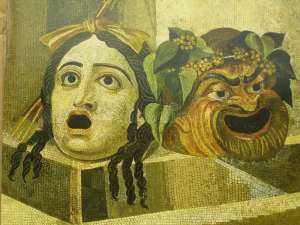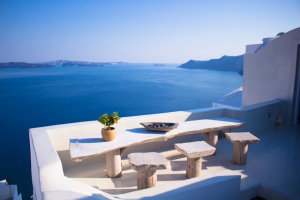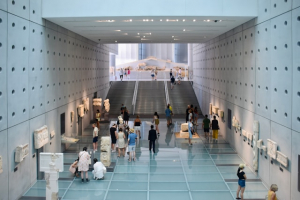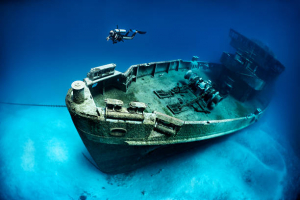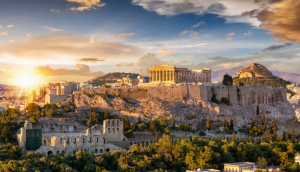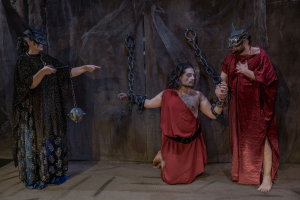LIFE & CULTURE
XpatAthens
Saturday, 13 July 2024 07:00
National Theatre Of Greece Presents Euripides' Bacchae
On Friday 2 and Saturday 3 August, the National Theatre of Greece presents Euripides’ The Bacchae, with Greek and English surtitles, at the Ancient Theatre of Epidaurus.
Directed by Thanos Papakonstantinou as part of the Athens Epidaurus Festival, this tragedy of mysticism and ecstasy – but also of barbarity – is an enthralling artistic experience orchestrated by the god of theatre himself, Dionysus.

About The Bacchae
When the god Dionysus arrives in Thebes, King Pentheus refuses to acknowledge his first cousin as a divinity and forbids his subjects to worship him. This excites the wrath of Dionysus, who, in a tragic reversal of persecutor and persecuted, leads Pentheus to destruction at the hands of his own mother.
Euripides wrote The Bacchae – a tragedy of Greeks, rulers and people, according to the great Polish theatre critic and theoretician Jan Kott – in the third decade of the Peloponnesian War, when History was now out of control. The great tragic poet composed it during his last year in Macedonia, where he had come into contact with the cult of Dionysus.

Not for the first time bringing his fellow-citizens face-to-face with behaviour that he had condemned throughout his life, Euripides constructed a tragedy – one of the few with Dionysus as a main character – about the god’s conflict with mortals, human virtue and savagery, caution and fallacy, and the rational and the irrational. For Euripides, when man is overcome by his bestial instincts, when barbarity awakens furiously within him, all social co-existence is negated, even when it is that cornerstone of society, the relationship of mother and child.
It is violence that means the end of the city-state of Athens. And as the tragedy grapples with the essence of human identity, political or individual (with the end of the latter), The Bacchae becomes – in many respects – a drama about the death of ancient tragedy itself.
Directed by Thanos Papakonstantinou as part of the Athens Epidaurus Festival, this tragedy of mysticism and ecstasy – but also of barbarity – is an enthralling artistic experience orchestrated by the god of theatre himself, Dionysus.

About The Bacchae
When the god Dionysus arrives in Thebes, King Pentheus refuses to acknowledge his first cousin as a divinity and forbids his subjects to worship him. This excites the wrath of Dionysus, who, in a tragic reversal of persecutor and persecuted, leads Pentheus to destruction at the hands of his own mother.
Euripides wrote The Bacchae – a tragedy of Greeks, rulers and people, according to the great Polish theatre critic and theoretician Jan Kott – in the third decade of the Peloponnesian War, when History was now out of control. The great tragic poet composed it during his last year in Macedonia, where he had come into contact with the cult of Dionysus.

Not for the first time bringing his fellow-citizens face-to-face with behaviour that he had condemned throughout his life, Euripides constructed a tragedy – one of the few with Dionysus as a main character – about the god’s conflict with mortals, human virtue and savagery, caution and fallacy, and the rational and the irrational. For Euripides, when man is overcome by his bestial instincts, when barbarity awakens furiously within him, all social co-existence is negated, even when it is that cornerstone of society, the relationship of mother and child.
It is violence that means the end of the city-state of Athens. And as the tragedy grapples with the essence of human identity, political or individual (with the end of the latter), The Bacchae becomes – in many respects – a drama about the death of ancient tragedy itself.
Published in
Performing Arts
Tagged under
Monday, 01 July 2024 17:02
5 Greek Tragedy Plays Everyone Should Watch
Greek tragedy is a cornerstone of Western literature, offering timeless stories of human struggle, fate, and the gods.
Here are five essential Greek tragedies that everyone should watch to appreciate the depth and beauty of this ancient art form!
1. Oedipus Rex (Oedipus the King) by Sophocles
"Oedipus Rex" is perhaps the most famous of all Greek tragedies. It tells the story of Oedipus, the king of Thebes, who is determined to rid his city of a plague. In his quest, he uncovers his tragic destiny: he has unwittingly killed his father and married his mother. The play explores themes of fate, free will, and the limits of human knowledge.
Why Watch It? The intricate plot and the intense emotional journey of Oedipus make this a must-see. Its exploration of fate and identity continues to resonate with modern audiences.
2. Antigone by Sophocles
"Antigone" is the sequel to "Oedipus Rex" and centers on Oedipus's daughter, Antigone. The play begins with the aftermath of a civil war in which Antigone's brothers have killed each other. King Creon, the new ruler, decrees that one brother will be honored while the other is left unburied. Antigone defies Creon’s orders to give her brother a proper burial, leading to tragic consequences.
Why Watch It? "Antigone" is a powerful examination of civil disobedience, the conflict between state and family loyalty, and the individual's moral duty versus societal laws.
3. Medea by Euripides
"Medea" is the harrowing story of Medea, a sorceress who takes revenge on her unfaithful husband, Jason. After Jason leaves her for another woman, Medea enacts a horrific vengeance, killing their children and Jason's new bride. Euripides' portrayal of Medea as a complex, multifaceted character challenges the audience's sympathies and preconceptions.
Why Watch It? The intense emotional drama and the radical portrayal of a woman's rage and agency make "Medea" a compelling and thought-provoking play.
4. The Oresteia by Aeschylus
"The Oresteia" is a trilogy consisting of three plays: "Agamemnon," "The Libation Bearers," and "The Eumenides." It follows the story of the House of Atreus, beginning with King Agamemnon’s return from the Trojan War and his murder by his wife, Clytemnestra. The cycle continues with their son Orestes avenging his father's death and concludes with Orestes being pursued by the Furies and seeking justice.
Why Watch It? This trilogy offers a profound exploration of justice, revenge, and the evolution of societal law. The transition from personal vengeance to institutionalized justice reflects themes still relevant today.
5. The Bacchae by Euripides
"The Bacchae" depicts the story of King Pentheus of Thebes and his resistance to the god Dionysus, who seeks to establish his cult in the city. Pentheus' refusal and subsequent attempts to suppress Dionysian worship lead to his own tragic downfall. The play highlights the struggle between reason and instinct, order and chaos.
Why Watch It? "The Bacchae" is a masterful exploration of the dualities within human nature and the dangers of denying one’s own instincts and the divine.
These five Greek tragedies offer a window into ancient Greek culture and universal themes that continue to resonate today. Watching these plays not only provides entertainment but also deepens our understanding of human nature, societal structures, and the complexities of fate and free will. Whether you are a newcomer to Greek drama or a seasoned enthusiast, these tragedies are essential viewing for anyone interested in the enduring power of storytelling.
Here are five essential Greek tragedies that everyone should watch to appreciate the depth and beauty of this ancient art form!
1. Oedipus Rex (Oedipus the King) by Sophocles
"Oedipus Rex" is perhaps the most famous of all Greek tragedies. It tells the story of Oedipus, the king of Thebes, who is determined to rid his city of a plague. In his quest, he uncovers his tragic destiny: he has unwittingly killed his father and married his mother. The play explores themes of fate, free will, and the limits of human knowledge.
Why Watch It? The intricate plot and the intense emotional journey of Oedipus make this a must-see. Its exploration of fate and identity continues to resonate with modern audiences.
2. Antigone by Sophocles
"Antigone" is the sequel to "Oedipus Rex" and centers on Oedipus's daughter, Antigone. The play begins with the aftermath of a civil war in which Antigone's brothers have killed each other. King Creon, the new ruler, decrees that one brother will be honored while the other is left unburied. Antigone defies Creon’s orders to give her brother a proper burial, leading to tragic consequences.
Why Watch It? "Antigone" is a powerful examination of civil disobedience, the conflict between state and family loyalty, and the individual's moral duty versus societal laws.
3. Medea by Euripides
"Medea" is the harrowing story of Medea, a sorceress who takes revenge on her unfaithful husband, Jason. After Jason leaves her for another woman, Medea enacts a horrific vengeance, killing their children and Jason's new bride. Euripides' portrayal of Medea as a complex, multifaceted character challenges the audience's sympathies and preconceptions.
Why Watch It? The intense emotional drama and the radical portrayal of a woman's rage and agency make "Medea" a compelling and thought-provoking play.
4. The Oresteia by Aeschylus
"The Oresteia" is a trilogy consisting of three plays: "Agamemnon," "The Libation Bearers," and "The Eumenides." It follows the story of the House of Atreus, beginning with King Agamemnon’s return from the Trojan War and his murder by his wife, Clytemnestra. The cycle continues with their son Orestes avenging his father's death and concludes with Orestes being pursued by the Furies and seeking justice.
Why Watch It? This trilogy offers a profound exploration of justice, revenge, and the evolution of societal law. The transition from personal vengeance to institutionalized justice reflects themes still relevant today.
5. The Bacchae by Euripides
"The Bacchae" depicts the story of King Pentheus of Thebes and his resistance to the god Dionysus, who seeks to establish his cult in the city. Pentheus' refusal and subsequent attempts to suppress Dionysian worship lead to his own tragic downfall. The play highlights the struggle between reason and instinct, order and chaos.
Why Watch It? "The Bacchae" is a masterful exploration of the dualities within human nature and the dangers of denying one’s own instincts and the divine.
These five Greek tragedies offer a window into ancient Greek culture and universal themes that continue to resonate today. Watching these plays not only provides entertainment but also deepens our understanding of human nature, societal structures, and the complexities of fate and free will. Whether you are a newcomer to Greek drama or a seasoned enthusiast, these tragedies are essential viewing for anyone interested in the enduring power of storytelling.
Published in
Greek Philosophy & History
Tagged under
Thursday, 27 June 2024 23:40
Unlocking Your Inner Entrepreneur: How Holidays In Greece Can Fuel Your Inspiration
Summer is the ideal time to relax, rejuvenate, and find inspiration for your entrepreneurial dreams. Greece, with its stunning landscapes, rich history, and vibrant culture, offers the perfect setting to unlock your inner entrepreneur and fuel your creative ambitions. Here’s how you can make the most of your holiday in Greece to inspire and drive your entrepreneurial journey.
1. Immersing in Natural Beauty
The Inspiration of the Greek Islands
The Greek islands, provide a serene backdrop that can help clear your mind and spark new ideas. Spending time in nature, whether it's on a tranquil beach or a scenic hike, allows you to step back from your daily routine, providing the mental space needed for creative thinking and problem-solving.
The Tranquility of the Mainland
For those who prefer the mountains or quieter mainland regions, places like the Peloponnese and the Pindus Mountains offer peaceful environments that are perfect for reflection. The quiet solitude of these areas can help you connect with your inner thoughts and generate innovative business ideas.
2. Drawing Lessons from History
Ancient Sites as Catalysts for Modern Ideas
Greece’s rich history and ancient sites are treasure troves of wisdom and inspiration. Visiting landmarks such as the Acropolis, the Temple of Apollo at Delphi, or the ancient theater of Epidaurus can provide insights into resilience, leadership, and strategic thinking. Reflecting on the achievements of ancient civilizations can inspire modern entrepreneurial strategies and visions.
Reading Ancient Philosophers
Take a book by an ancient Greek philosopher to the beach or a quiet terrace. As you read the words of Plato, or Aristotle, gaze at the ocean and its infinite fluidity, reflecting on how their timeless wisdom can be applied to your modern-day challenges. The depth of their thoughts can unlock new perspectives and inspire profound insights into your business and personal life.
Museums and Cultural Heritage
Exploring museums like the National Archaeological Museum in Athens or the Archaeological Museum of Heraklion in Crete offers a deep dive into Greece’s cultural heritage. The stories and artifacts from different eras highlight human ingenuity and adaptability, qualities that are essential for any entrepreneur. Let the creativity and innovation of the past fuel your own entrepreneurial spirit.
3. Networking with Local Entrepreneurs
Engaging with Greece's Startup Scene
Greece is home to a vibrant community of startups and innovative businesses. Attending local business events, workshops, and networking sessions can provide valuable opportunities to connect with like-minded entrepreneurs. Sharing experiences and learning from local success stories can offer new perspectives and practical advice for your own ventures.
Learning from Local Business Practices
Greek businesses, whether they are traditional family-owned enterprises or modern tech startups, offer unique insights into customer service, product development, and market adaptation. Observing and engaging with these businesses can provide lessons that you can apply to your entrepreneurial journey.
4. Cultivating Creativity
Artistic & Culinary Exploration
Greece’s rich artistic heritage and culinary traditions are perfect for sparking creativity. Visit local art galleries, attend cultural festivals, or take part in a cooking class to immerse yourself in Greek culture. The creativity you encounter in these activities can inspire innovative thinking and new business ideas.
Embracing the Greek Way of Life
Greek culture emphasizes a balanced lifestyle, valuing both hard work and leisure. Embrace this approach by taking time to relax, socialize, and enjoy life. This balance can lead to better mental clarity, increased creativity, and improved problem-solving abilities.
5. Rejuvenating Your Mind & Body
Wellness Retreats & Relaxation
Greece offers numerous wellness retreats, spas, and yoga centers where you can rejuvenate both your mind and body. Taking time to relax and recharge is essential for maintaining the energy and motivation needed for entrepreneurial success. Wellness activities can help clear mental blockages and provide a fresh perspective on your goals.
Outdoor Adventures
Engaging in outdoor activities, such as hiking, sailing, or diving, not only boosts your physical health but also stimulates your mind. The sense of adventure and exploration can translate into a more dynamic and innovative approach to your business ventures.
1. Immersing in Natural Beauty
The Inspiration of the Greek Islands
The Greek islands, provide a serene backdrop that can help clear your mind and spark new ideas. Spending time in nature, whether it's on a tranquil beach or a scenic hike, allows you to step back from your daily routine, providing the mental space needed for creative thinking and problem-solving.
The Tranquility of the Mainland
For those who prefer the mountains or quieter mainland regions, places like the Peloponnese and the Pindus Mountains offer peaceful environments that are perfect for reflection. The quiet solitude of these areas can help you connect with your inner thoughts and generate innovative business ideas.
2. Drawing Lessons from History
Ancient Sites as Catalysts for Modern Ideas
Greece’s rich history and ancient sites are treasure troves of wisdom and inspiration. Visiting landmarks such as the Acropolis, the Temple of Apollo at Delphi, or the ancient theater of Epidaurus can provide insights into resilience, leadership, and strategic thinking. Reflecting on the achievements of ancient civilizations can inspire modern entrepreneurial strategies and visions.
Reading Ancient Philosophers
Take a book by an ancient Greek philosopher to the beach or a quiet terrace. As you read the words of Plato, or Aristotle, gaze at the ocean and its infinite fluidity, reflecting on how their timeless wisdom can be applied to your modern-day challenges. The depth of their thoughts can unlock new perspectives and inspire profound insights into your business and personal life.
Museums and Cultural Heritage
Exploring museums like the National Archaeological Museum in Athens or the Archaeological Museum of Heraklion in Crete offers a deep dive into Greece’s cultural heritage. The stories and artifacts from different eras highlight human ingenuity and adaptability, qualities that are essential for any entrepreneur. Let the creativity and innovation of the past fuel your own entrepreneurial spirit.
3. Networking with Local Entrepreneurs
Engaging with Greece's Startup Scene
Greece is home to a vibrant community of startups and innovative businesses. Attending local business events, workshops, and networking sessions can provide valuable opportunities to connect with like-minded entrepreneurs. Sharing experiences and learning from local success stories can offer new perspectives and practical advice for your own ventures.
Learning from Local Business Practices
Greek businesses, whether they are traditional family-owned enterprises or modern tech startups, offer unique insights into customer service, product development, and market adaptation. Observing and engaging with these businesses can provide lessons that you can apply to your entrepreneurial journey.
4. Cultivating Creativity
Artistic & Culinary Exploration
Greece’s rich artistic heritage and culinary traditions are perfect for sparking creativity. Visit local art galleries, attend cultural festivals, or take part in a cooking class to immerse yourself in Greek culture. The creativity you encounter in these activities can inspire innovative thinking and new business ideas.
Embracing the Greek Way of Life
Greek culture emphasizes a balanced lifestyle, valuing both hard work and leisure. Embrace this approach by taking time to relax, socialize, and enjoy life. This balance can lead to better mental clarity, increased creativity, and improved problem-solving abilities.
5. Rejuvenating Your Mind & Body
Wellness Retreats & Relaxation
Greece offers numerous wellness retreats, spas, and yoga centers where you can rejuvenate both your mind and body. Taking time to relax and recharge is essential for maintaining the energy and motivation needed for entrepreneurial success. Wellness activities can help clear mental blockages and provide a fresh perspective on your goals.
Outdoor Adventures
Engaging in outdoor activities, such as hiking, sailing, or diving, not only boosts your physical health but also stimulates your mind. The sense of adventure and exploration can translate into a more dynamic and innovative approach to your business ventures.
Published in
Tips & Advice
Tagged under
Thursday, 27 June 2024 23:13
The New Excavation Museum: A Journey Through Time Beneath The Acropolis
A significant addition to the world of museums opened its doors yesterday, Wednesday, June 26, 2024 both to Greek citizens and international visitors. Nestled beneath the renowned Acropolis Museum, this new exhibit space, the Excavation Museum, showcases a fascinating collection of 1,150 artifacts. These objects, unearthed during the extensive excavations conducted for the construction of the Acropolis Museum and the Athens Metro "Acropolis" station, bear witness to over 4,500 years of human history.
The grand opening of the Excavation Museum was celebrated on Tuesday, June 25, presided over by Her Excellency, the President of the Hellenic Republic, Katerina Sakellaropoulou. This new museum offers a unique perspective on the past, presenting artifacts in a way that connects visitors directly with the lives of ancient inhabitants.
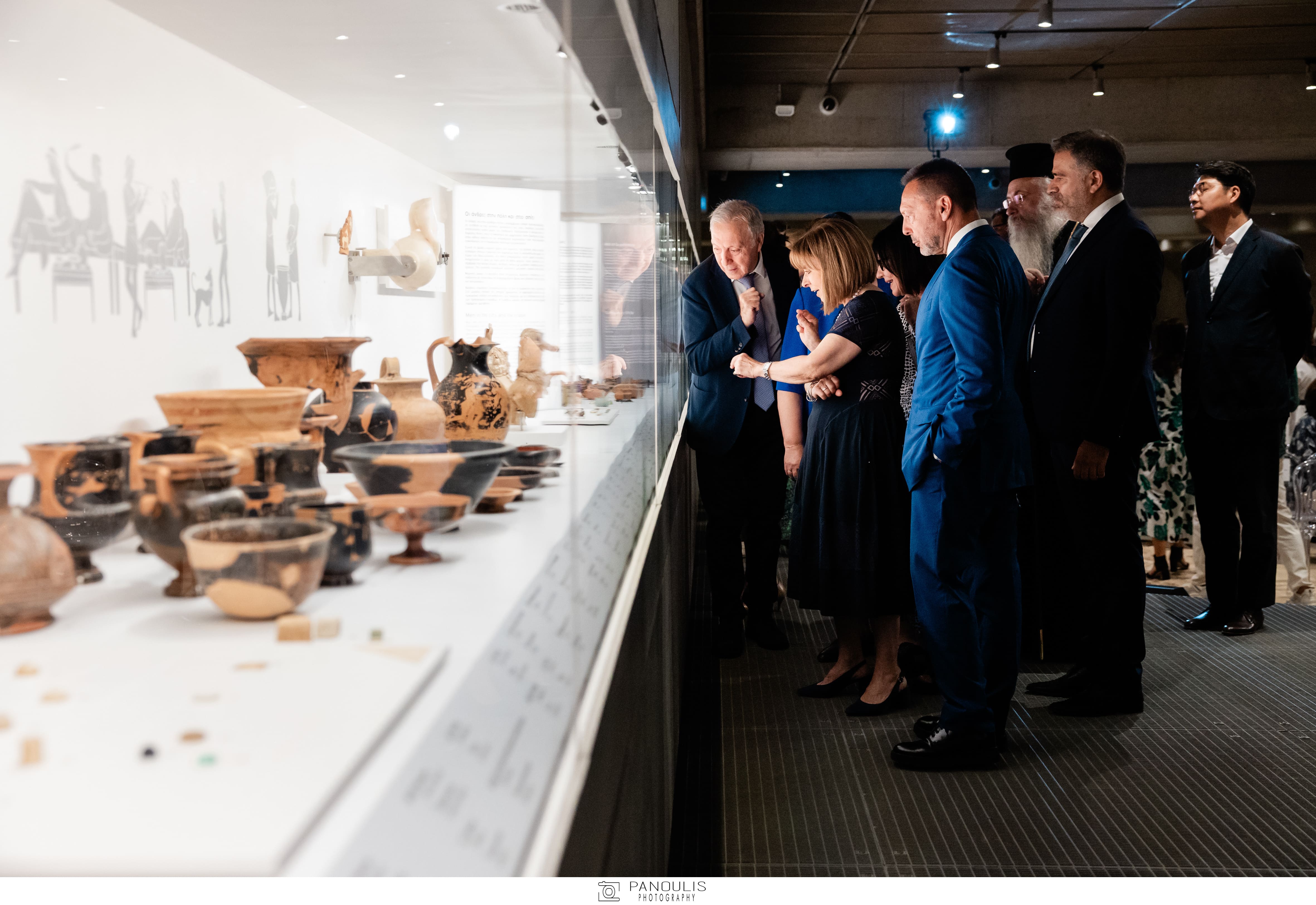
A Walk Through History
Upon entering, visitors are greeted by a striking display: 1,150 artifacts arranged in a 35-meter-long showcase. This exhibit resembles a luminous fissure in time, a crack in the spatial continuum that represents the latest layer above the archaeological strata visible around you. The items on display span various periods, each telling a story of the people who lived, worked, and worshipped in this historic area. Memories of Destruction and Revival The journey continues with a section dedicated to the memories of Athens' destruction by Sulla in 86 BC. This part of the exhibit poignantly captures the city's resilience and the enduring spirit of its people.
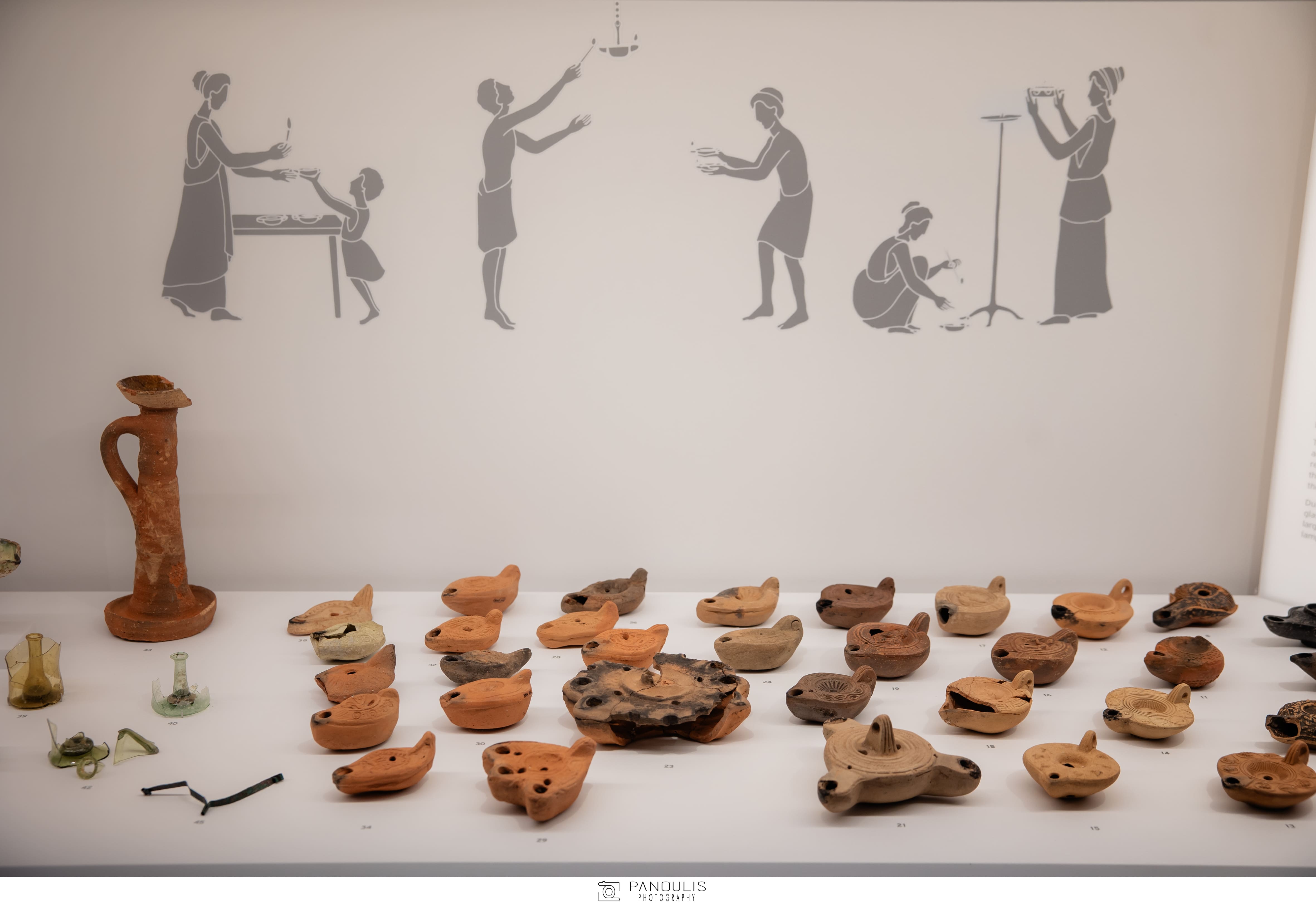
The Pantheon of Gods & Philosophers
The museum culminates in an enclosed hall, adorned with statues and reliefs of gods and mortals. Here, visitors can marvel at representations of Athena, Artemis, Cybele, Aphrodite, and Asclepius—deities who were central to the lives of Athenians, invoked for the protection of the city, the health and growth of children, love, and the healing of human suffering. In addition to these divine figures, the hall features portraits of renowned philosophers like Plato and Aristotle, as well as a likeness of Empress Eudocia, bridging the ancient and the more recent past.
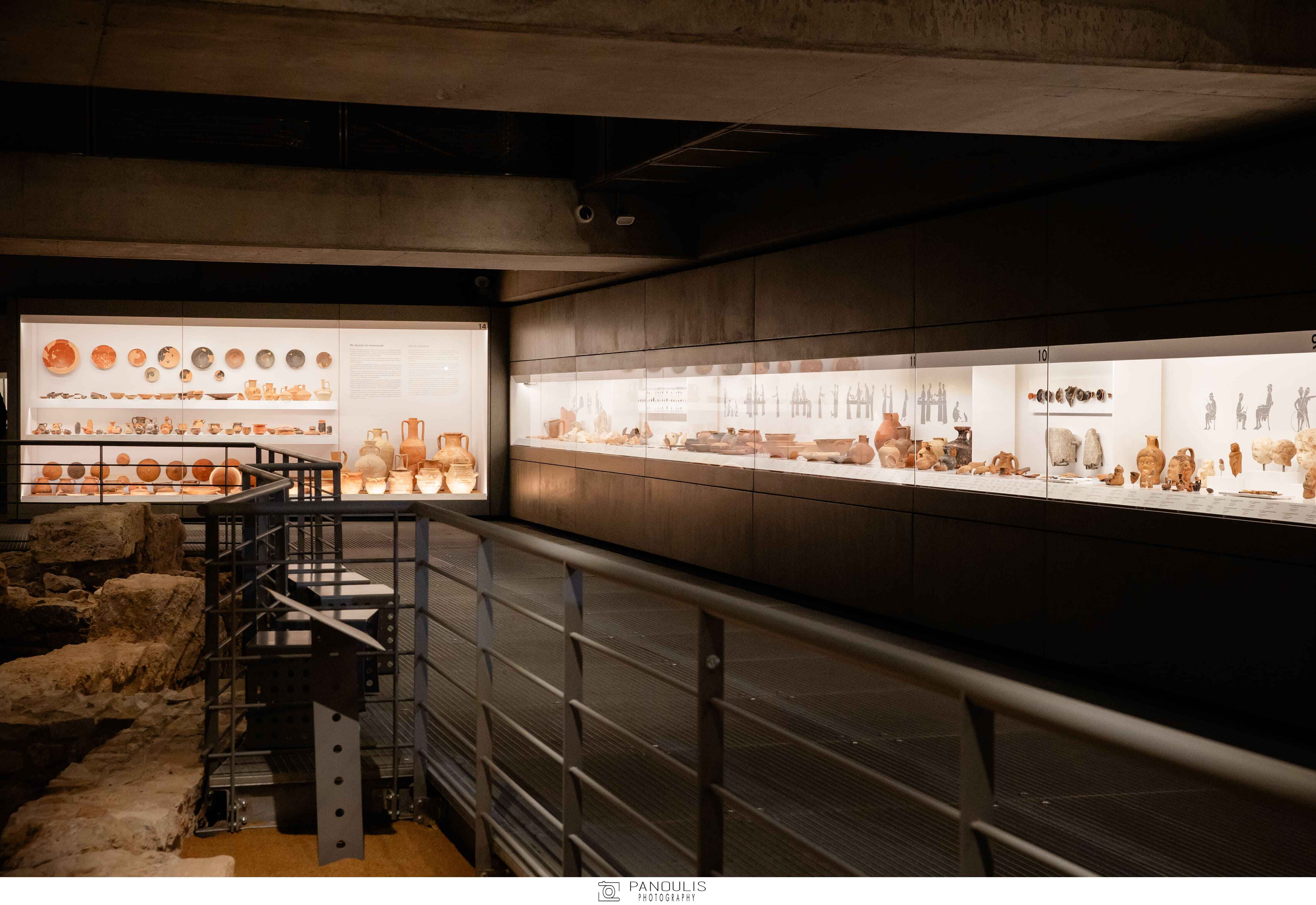
The grand opening of the Excavation Museum was celebrated on Tuesday, June 25, presided over by Her Excellency, the President of the Hellenic Republic, Katerina Sakellaropoulou. This new museum offers a unique perspective on the past, presenting artifacts in a way that connects visitors directly with the lives of ancient inhabitants.

A Walk Through History
Upon entering, visitors are greeted by a striking display: 1,150 artifacts arranged in a 35-meter-long showcase. This exhibit resembles a luminous fissure in time, a crack in the spatial continuum that represents the latest layer above the archaeological strata visible around you. The items on display span various periods, each telling a story of the people who lived, worked, and worshipped in this historic area. Memories of Destruction and Revival The journey continues with a section dedicated to the memories of Athens' destruction by Sulla in 86 BC. This part of the exhibit poignantly captures the city's resilience and the enduring spirit of its people.

The Pantheon of Gods & Philosophers
The museum culminates in an enclosed hall, adorned with statues and reliefs of gods and mortals. Here, visitors can marvel at representations of Athena, Artemis, Cybele, Aphrodite, and Asclepius—deities who were central to the lives of Athenians, invoked for the protection of the city, the health and growth of children, love, and the healing of human suffering. In addition to these divine figures, the hall features portraits of renowned philosophers like Plato and Aristotle, as well as a likeness of Empress Eudocia, bridging the ancient and the more recent past.

Published in
Local News
Tagged under
Thursday, 27 June 2024 23:02
The Peristera Shipwreck: Unveiling Greece’s Underwater Marvel
Discovery of a Sunken Giant
In 1982, the serene waters around the islet of Peristera near Alonissos held a tantalizing secret. Greek diver and fisherman Dimitrios Mavrikis, along with his son Kostas, stumbled upon a remarkable underwater find—a vast Classical-era shipwreck lying at a depth of 20 meters. This discovery, later brought to the attention of the Ephorate of Underwater Antiquities, unveiled a significant chapter in maritime history. The wreck, dated to the 5th century BC, was laden with a cargo of 3000 to 4000 amphoras, revealing it as the largest transport ship known from that era.
Excavation of an Ancient Treasure
In 1992, systematic excavation efforts commenced under the guidance of Elpida Hadjidaki, the director of the Ephorate of Underwater Antiquities. Initial surveys produced a photomosaic, illustrating the wreck's layout. The site was then divided into a grid to facilitate meticulous excavation. Layer by layer, archaeologists unearthed amphoras, black-glazed cups, plates, and bronze tableware. The amphoras, primarily from Mende and Skopelos, indicated the ship's role in transporting wine across ancient Greek trade routes. Excavations in subsequent years revealed more artifacts, including personal items of the crew such as oil lamps and mortars, and critical fragments of the ship's wooden hull and treenails, offering insights into ancient shipbuilding techniques.
A Monumental Maritime Vessel
The Peristera shipwreck stands out not just for its vast cargo but also for its sheer size. Measuring approximately 25 to 30 meters in length, the ship was capable of carrying up to 126 metric tons. This capacity was a revelation, challenging previous assumptions that such large-scale maritime transportation was only achieved during the Roman period. The ship's construction and the volume of its cargo highlight the advanced shipbuilding skills of ancient Greek craftsmen.
The Birth of the Alonissos Underwater Museum
Fast forward to 2020, the site was transformed into the Alonissos Underwater Museum, Greece's first underwater museum, offering an extraordinary experience for scuba diving enthusiasts. The museum allows visitors to dive into history, exploring the wreck in its natural underwater setting within the protected Alonissos Marine Park.
In 1982, the serene waters around the islet of Peristera near Alonissos held a tantalizing secret. Greek diver and fisherman Dimitrios Mavrikis, along with his son Kostas, stumbled upon a remarkable underwater find—a vast Classical-era shipwreck lying at a depth of 20 meters. This discovery, later brought to the attention of the Ephorate of Underwater Antiquities, unveiled a significant chapter in maritime history. The wreck, dated to the 5th century BC, was laden with a cargo of 3000 to 4000 amphoras, revealing it as the largest transport ship known from that era.
Excavation of an Ancient Treasure
In 1992, systematic excavation efforts commenced under the guidance of Elpida Hadjidaki, the director of the Ephorate of Underwater Antiquities. Initial surveys produced a photomosaic, illustrating the wreck's layout. The site was then divided into a grid to facilitate meticulous excavation. Layer by layer, archaeologists unearthed amphoras, black-glazed cups, plates, and bronze tableware. The amphoras, primarily from Mende and Skopelos, indicated the ship's role in transporting wine across ancient Greek trade routes. Excavations in subsequent years revealed more artifacts, including personal items of the crew such as oil lamps and mortars, and critical fragments of the ship's wooden hull and treenails, offering insights into ancient shipbuilding techniques.
A Monumental Maritime Vessel
The Peristera shipwreck stands out not just for its vast cargo but also for its sheer size. Measuring approximately 25 to 30 meters in length, the ship was capable of carrying up to 126 metric tons. This capacity was a revelation, challenging previous assumptions that such large-scale maritime transportation was only achieved during the Roman period. The ship's construction and the volume of its cargo highlight the advanced shipbuilding skills of ancient Greek craftsmen.
The Birth of the Alonissos Underwater Museum
Fast forward to 2020, the site was transformed into the Alonissos Underwater Museum, Greece's first underwater museum, offering an extraordinary experience for scuba diving enthusiasts. The museum allows visitors to dive into history, exploring the wreck in its natural underwater setting within the protected Alonissos Marine Park.
Diving into History
The opening of the Alonissos Underwater Museum provides a unique window into ancient Greek history. Divers can witness firsthand the amphoras scattered across the seabed, forming a mound that outlines the ship's original structure. The museum combines the thrill of underwater exploration with a profound educational experience, showcasing the daily life, trade practices, and maritime prowess of ancient Greece.
Why Visit the Alonissos Underwater Museum?
Visiting the Alonissos Underwater Museum is a unique adventure that blends history, archaeology, and the natural beauty of the Aegean Sea. Here are compelling reasons to dive into this underwater marvel:
1. Immersive Historical Experience: The museum offers a rare opportunity to explore a well-preserved ancient shipwreck in its original underwater context. It's like stepping back in time to the Classical period.
2. Unique Diving Adventure: For scuba diving enthusiasts, this site provides a thrilling dive, ranked among the nine most important underwater museums in the world by News9live.com. The crystal-clear waters and the haunting beauty of the ancient shipwreck make for an unforgettable experience.
3. Educational Insight: The museum offers an educational journey through ancient Greek maritime history, trade, and shipbuilding techniques. It's an engaging way to learn about the past while enjoying a recreational activity.
4. Conservation and Protection: As part of the Alonissos Marine Park, visiting the museum supports efforts to protect and preserve underwater cultural heritage, ensuring these historical treasures remain intact for future generations.
Significance & Global Recognition
The Peristera shipwreck is not just a local treasure; it has garnered international acclaim. In a survey presented by the international news website News9live.com, the Alonissos Underwater Museum was ranked among the nine most important underwater museums in the world. This recognition underscores its global significance as a site of cultural heritage and archaeological importance.
A New Era in Underwater Archaeology
The Peristera shipwreck not only enriches our understanding of ancient Greek trade and shipbuilding but also marks a new era in underwater archaeology. The establishment of the underwater museum sets a precedent for future explorations and public engagement with underwater cultural heritage. It underscores the importance of preserving and studying submerged archaeological sites, offering both scholars and the public a chance to connect with history in an immersive and innovative way.
The opening of the Alonissos Underwater Museum provides a unique window into ancient Greek history. Divers can witness firsthand the amphoras scattered across the seabed, forming a mound that outlines the ship's original structure. The museum combines the thrill of underwater exploration with a profound educational experience, showcasing the daily life, trade practices, and maritime prowess of ancient Greece.
Why Visit the Alonissos Underwater Museum?
Visiting the Alonissos Underwater Museum is a unique adventure that blends history, archaeology, and the natural beauty of the Aegean Sea. Here are compelling reasons to dive into this underwater marvel:
1. Immersive Historical Experience: The museum offers a rare opportunity to explore a well-preserved ancient shipwreck in its original underwater context. It's like stepping back in time to the Classical period.
2. Unique Diving Adventure: For scuba diving enthusiasts, this site provides a thrilling dive, ranked among the nine most important underwater museums in the world by News9live.com. The crystal-clear waters and the haunting beauty of the ancient shipwreck make for an unforgettable experience.
3. Educational Insight: The museum offers an educational journey through ancient Greek maritime history, trade, and shipbuilding techniques. It's an engaging way to learn about the past while enjoying a recreational activity.
4. Conservation and Protection: As part of the Alonissos Marine Park, visiting the museum supports efforts to protect and preserve underwater cultural heritage, ensuring these historical treasures remain intact for future generations.
Significance & Global Recognition
The Peristera shipwreck is not just a local treasure; it has garnered international acclaim. In a survey presented by the international news website News9live.com, the Alonissos Underwater Museum was ranked among the nine most important underwater museums in the world. This recognition underscores its global significance as a site of cultural heritage and archaeological importance.
A New Era in Underwater Archaeology
The Peristera shipwreck not only enriches our understanding of ancient Greek trade and shipbuilding but also marks a new era in underwater archaeology. The establishment of the underwater museum sets a precedent for future explorations and public engagement with underwater cultural heritage. It underscores the importance of preserving and studying submerged archaeological sites, offering both scholars and the public a chance to connect with history in an immersive and innovative way.
Published in
Travel Greece
Tagged under
Thursday, 20 June 2024 11:17
Can You Raise Happy Children?
One of a parent’s greatest dreams is for their child to be happy. For many, happiness seems elusive and subjective. But could it be simpler than we think? What if we could secure our children's happiness?
Let’s address this question with a profound truth: parents wield enormous influence over their children's emotional well-being. The parental impact on shaping children’s happiness is well-documented and has transformative potential.
Let’s explore the various ways parents hold the key to cultivating their children's capacity for lasting happiness and fulfillment!
Being the Example
Children are keen observers, absorbing not just words but actions and behaviors of their parents. Thus, one of the most powerful ways parents can teach happiness is by experiencing it themselves. By cultivating our own sense of well-being, engaging in activities that bring us joy, and practicing gratitude, we become living examples of happiness. When children see their parents happy, they learn resilience, optimism, and zest for life, internalizing happiness and laying the foundation for their own emotional well-being.
Emotional Intelligence: The Power of Connection
Emotional intelligence is a crucial predictor of a child's long-term happiness. By promoting skills of open communication, empathy, and emotional regulation, parents equip their children with the tools to navigate life’s ups and downs with resilience and grace. Encouraging children to express their emotions freely, validating their feelings, and providing a safe space to explore their inner world fosters a sense of emotional security and self-awareness, essential for happiness.
Positive Environment: Planting the Seeds of Happiness
The environment serves as the fertile ground where children's emotional well-being takes root and flourishes. Parents can create a positive atmosphere by infusing daily interactions with warmth, affection, and encouragement. Celebrating successes, no matter how small, and offering support and reassurance during tough times cultivates a sense of competence and confidence in children, boosting their self-esteem and resilience. Additionally, creating bonding rituals—such as family meals, shared activities, or bedtime routines—fosters a sense of belonging and strengthens family ties, promoting feelings of happiness and security.
Loving Imperfections
In the pursuit of happiness, it's important for parents to embrace their children’s imperfections as an integral part of growth. Recognizing and learning from mistakes, reframing challenges as growth opportunities, and demonstrating compassion show that failures are a natural part of life’s journey. This way, parents instill a positive and resilient mindset in their children, allowing them to live with optimism and courage—fundamental pillars of happiness.
As parents, it is our responsibility to create an environment where our children feel safe to explore, express themselves, and learn from both successes and failures. Through our actions and behaviors, we have the power to shape their perceptions of themselves and the world around them.
Let’s embark on the parenting journey with intention, compassion, and a steadfast commitment to cultivating a legacy of happiness that will endure for generations. In doing so, we not only ensure our children’s well-being but also contribute to creating a brighter future for all.

Love Yourself is a comprehensive Greek media platform dedicated to embracing mindstyle as its fundamental essence. It advocates for a wholesome lifestyle that nurtures not only our soul, mind, and body but also promotes a positive and sustainable attitude towards the planet we call home. For more information, visit Love Yourself's website!
Let’s address this question with a profound truth: parents wield enormous influence over their children's emotional well-being. The parental impact on shaping children’s happiness is well-documented and has transformative potential.
Let’s explore the various ways parents hold the key to cultivating their children's capacity for lasting happiness and fulfillment!
Being the Example
Children are keen observers, absorbing not just words but actions and behaviors of their parents. Thus, one of the most powerful ways parents can teach happiness is by experiencing it themselves. By cultivating our own sense of well-being, engaging in activities that bring us joy, and practicing gratitude, we become living examples of happiness. When children see their parents happy, they learn resilience, optimism, and zest for life, internalizing happiness and laying the foundation for their own emotional well-being.
Emotional Intelligence: The Power of Connection
Emotional intelligence is a crucial predictor of a child's long-term happiness. By promoting skills of open communication, empathy, and emotional regulation, parents equip their children with the tools to navigate life’s ups and downs with resilience and grace. Encouraging children to express their emotions freely, validating their feelings, and providing a safe space to explore their inner world fosters a sense of emotional security and self-awareness, essential for happiness.
Positive Environment: Planting the Seeds of Happiness
The environment serves as the fertile ground where children's emotional well-being takes root and flourishes. Parents can create a positive atmosphere by infusing daily interactions with warmth, affection, and encouragement. Celebrating successes, no matter how small, and offering support and reassurance during tough times cultivates a sense of competence and confidence in children, boosting their self-esteem and resilience. Additionally, creating bonding rituals—such as family meals, shared activities, or bedtime routines—fosters a sense of belonging and strengthens family ties, promoting feelings of happiness and security.
Loving Imperfections
In the pursuit of happiness, it's important for parents to embrace their children’s imperfections as an integral part of growth. Recognizing and learning from mistakes, reframing challenges as growth opportunities, and demonstrating compassion show that failures are a natural part of life’s journey. This way, parents instill a positive and resilient mindset in their children, allowing them to live with optimism and courage—fundamental pillars of happiness.
As parents, it is our responsibility to create an environment where our children feel safe to explore, express themselves, and learn from both successes and failures. Through our actions and behaviors, we have the power to shape their perceptions of themselves and the world around them.
Let’s embark on the parenting journey with intention, compassion, and a steadfast commitment to cultivating a legacy of happiness that will endure for generations. In doing so, we not only ensure our children’s well-being but also contribute to creating a brighter future for all.
Originally published in Greek, on: loveyourselfmagazine.com

Love Yourself is a comprehensive Greek media platform dedicated to embracing mindstyle as its fundamental essence. It advocates for a wholesome lifestyle that nurtures not only our soul, mind, and body but also promotes a positive and sustainable attitude towards the planet we call home. For more information, visit Love Yourself's website!
Published in
Parenting
Tagged under
Thursday, 20 June 2024 10:41
A Day Ιn Τhe Life Οf Αn Ancient Athenian
Imagine waking up in ancient Athens, one of the most prominent city-states in ancient Greece. Your day would vary depending on your social status, gender, and occupation.
Here's a detailed look at how different individuals might spend their day.
Morning: The Start of the Day
Men:
Here's a detailed look at how different individuals might spend their day.
Morning: The Start of the Day
Men:
- Rise with the Sun: Men typically rose at dawn. They would wash up quickly, often using cold water, as hot water was a luxury.
- Breakfast: A simple breakfast, known as "akratisma," consisted of barley bread dipped in wine, sometimes accompanied by figs or olives.
- Work & Public Affairs: For many men, the morning was a time for work. Farmers would head to their fields to tend to crops like olives, grapes, and grains. Craftsmen and artisans would open their workshops to work on pottery, textiles, or metal goods. Merchants might head to the agora, the bustling marketplace, to trade goods.
- Politics and Philosophy: In cities like Athens, men often engaged in political discussions or attended meetings at the assembly. Philosophers and students might gather at the gymnasium or in private homes to discuss ideas and theories.
Women:
- Household Chores: Women usually woke up early to manage household tasks. They were responsible for preparing meals, spinning and weaving cloth, and caring for children.
- Breakfast: Similar to men, women also had a simple breakfast. They might eat with their children before the day’s chores began.
- Domestic Work: Women spent much of the morning engaged in domestic duties, which included cleaning, fetching water, and making clothes.
Midday: The Heart of Daily Activities
Men:
- Continued Work: Farmers would continue their labor in the fields, while artisans and craftsmen worked on their trades. The marketplace remained lively with merchants and buyers haggling over goods.
- Meals: The midday meal, known as "ariston," was light, often consisting of bread, cheese, fruits, and perhaps some fish.
- Leisure and Socializing: Men might take a break to socialize at the agora, discussing politics, philosophy, or daily news. Public baths were also a popular place to relax and converse
- Household Management: Women continued with their household responsibilities. Wealthier women might have slaves to assist with chores, allowing them more time for weaving or managing household finances.
- Midday Meal: Women and children would have their ariston together, similar to what the men ate.
- Religious Duties: Women often participated in religious rituals and household worship, paying homage to gods and goddesses to ensure the family’s well-being.
Afternoon: Winding Down the Day
Men:
- Return Home: Farmers and workers would return home as the sun began to set. Before dinner, men might visit the public baths to cleanse and relax.
- Symposia and Social Gatherings: Wealthier men might attend symposia, which were social gatherings involving drinking, music, and philosophical discussions. These events were important for networking and entertainment.
- Dinner: The main meal of the day, "deipnon," was consumed in the evening. It included more substantial fare such as fish, legumes, vegetables, and occasionally meat. Wine, diluted with water, was a common accompaniment.
Women:
- Evening Chores: As the day wound down, women would finish any remaining chores, prepare for the evening meal, and ensure the household was in order.
- Dinner: Women and children would have their deipnon separately from the men. This meal was more substantial than the midday meal, featuring stews, bread, vegetables, and fruits.
- Evening Activities: After dinner, women might engage in spinning, weaving, or other crafts. They also participated in evening prayers and rituals.
- Family Time: After dinner, families might spend some time together before bed. Stories and myths were shared, often teaching moral lessons or entertaining the children.
- Rest: With the day's work done, the household would retire for the night, ready to begin the routine anew with the dawn.
Published in
Greek Philosophy & History
Tagged under
Monday, 15 July 2024 14:00
Venus In Fur By David Ives At Theatre Of The No
Written by David Ives
Directed by Racha Gabriel
Premieres on Friday 28th June
Directed by Racha Gabriel
Premieres on Friday 28th June
This masterpiece impresses with its skillful blend of drama and dark comedy, seduction and kink, desire and deception, highlighting the intense erotic tensions and power games between the sexes.. A smash Broadway hit, it is hailed by the New York Times as “seriously smart and very funny”.


The plot unfolds in the office of playwright and director Thomas Novachek, who is conducting auditions to find the ideal actress to play Vanda in his adaptation of Leopold von Sacher-Masoch's "Venus in Fur". Disheartened and anxious, fearing he won't find an actress good enough for the lead role, Thomas reluctantly agrees to see the tardy Vanda Jordan. This enigmatic actress, with her charismatic presence, draws Thomas into a dangerous game of power and sexual submission, raising questions about her true identity and motives for visiting the arrogant director.
"Venus in Fur" turns into a play within a play, and the audience is caught between what is "real" and what is "acted". Lines are blurred as actress and director become the characters of the play, creating a mesmerizing and thought-provoking experience.


CAST
Written by: David Ives
Directed by: Racha Gabriel
Actors: Amaryllis Asimakopoulou, Dirk Sikorski
Dialogue/Acting Coach: David Rawstron
Lighting Designer: Fernanda Balcells
Score & Set Design: Yesh
Set & Props: Dimitris Mellos
Publicity – Communication: Eleftheria Sakareli
PERFORMANCE DATES
28th June – 5th August
Every Friday, Saturday, Sunday, Monday at 20.00
ΤICKETS
15€
Drama Student Discount: tickets at the theatre box office for €12.
Early Arrival Discount: Α limited number of tickets are available for €5 to people arriving 1 hour before the performance.
Directed by: Racha Gabriel
Actors: Amaryllis Asimakopoulou, Dirk Sikorski
Dialogue/Acting Coach: David Rawstron
Lighting Designer: Fernanda Balcells
Score & Set Design: Yesh
Set & Props: Dimitris Mellos
Publicity – Communication: Eleftheria Sakareli
PERFORMANCE DATES
28th June – 5th August
Every Friday, Saturday, Sunday, Monday at 20.00
ΤICKETS
15€
Drama Student Discount: tickets at the theatre box office for €12.
Early Arrival Discount: Α limited number of tickets are available for €5 to people arriving 1 hour before the performance.
Published in
Performing Arts
Tagged under
Monday, 15 July 2024 07:00
Prometheus Bound At The Theatre Of The No
Theatre of the No, the first English-speaking theater in Athens, presents the Opera "Prometheus Bound" with music and libretto by Panagiotis Karousos. The production, based on the ancient tragedy written by Aeschylus, will premier on June 12, 2024, and run for a limited engagement of 7 performances, every Wednesday at 20:00, until July 24, 2024.
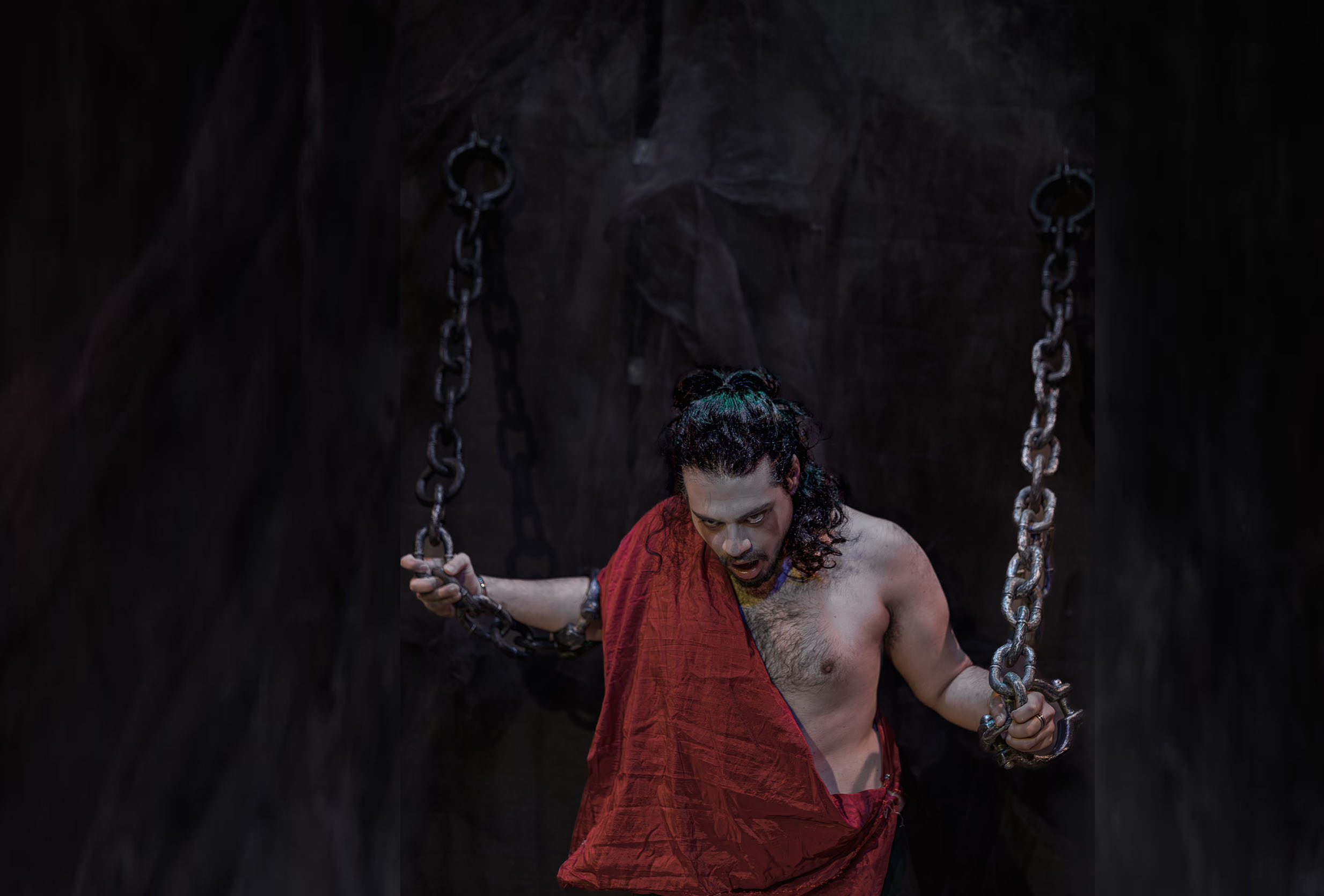
"Prometheus Bound" is a melodic opera that follows the journey of Prometheus, a symbol of independence and enlightenment and infused with romanticism and lyrical exuberance, transporting the listener into a magical mysterious world.
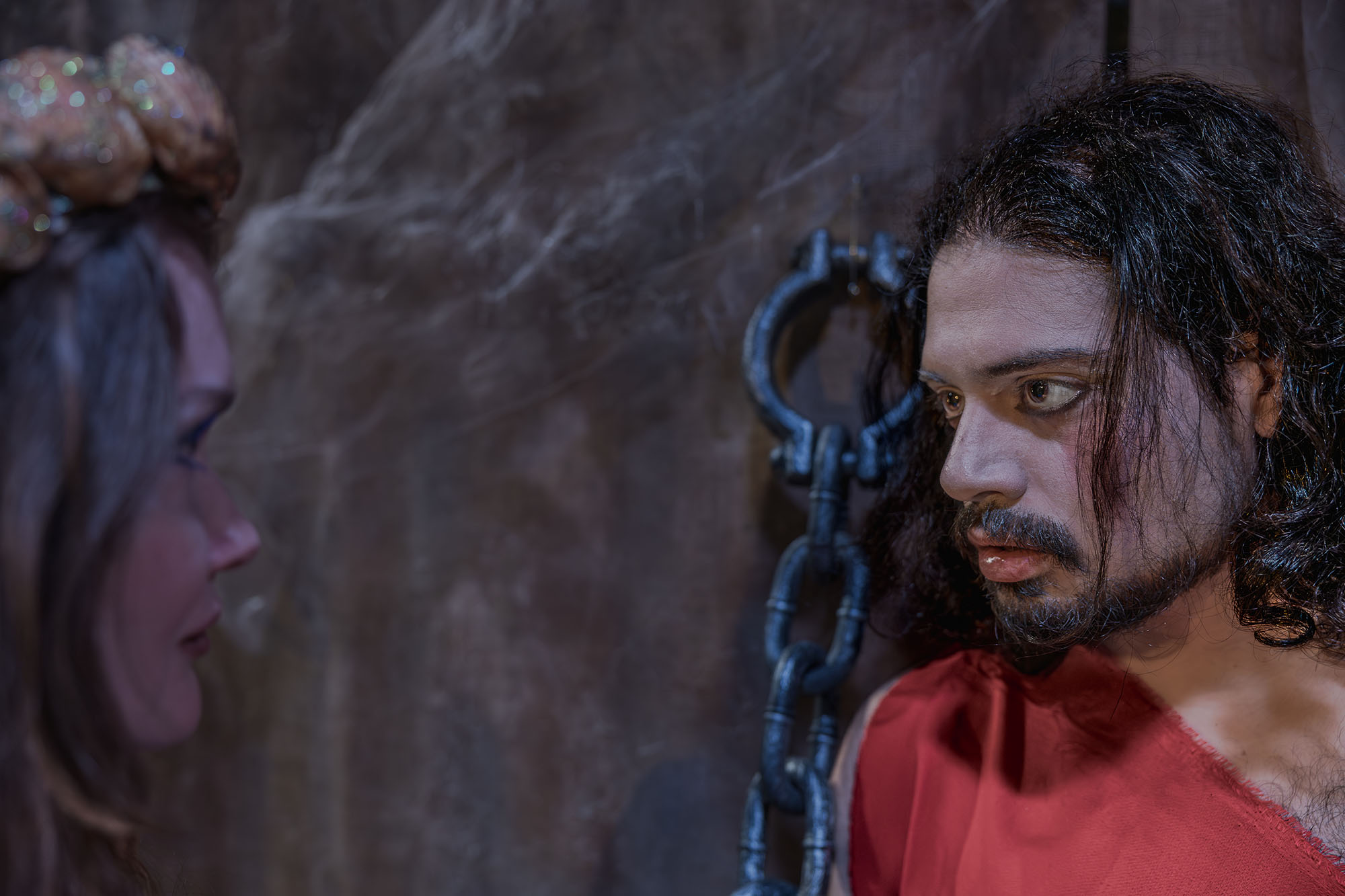
The timeless myth of Prometheus remains profoundly relevant, presenting humanity with the eternal dilemma of rebellion against tyrannical power in any historical era, and the destructive effect of passive attitudes. The rebellious Prometheus is the first known individual who rebelled against the authorities for the sake of the people, rebelling against the power of Zeus who was trying to exterminate the human race.
Prometheus Bound originally premiered in Montreal, Canada in 1994 and was performed intermittently in New York, Washington DC and Paris.
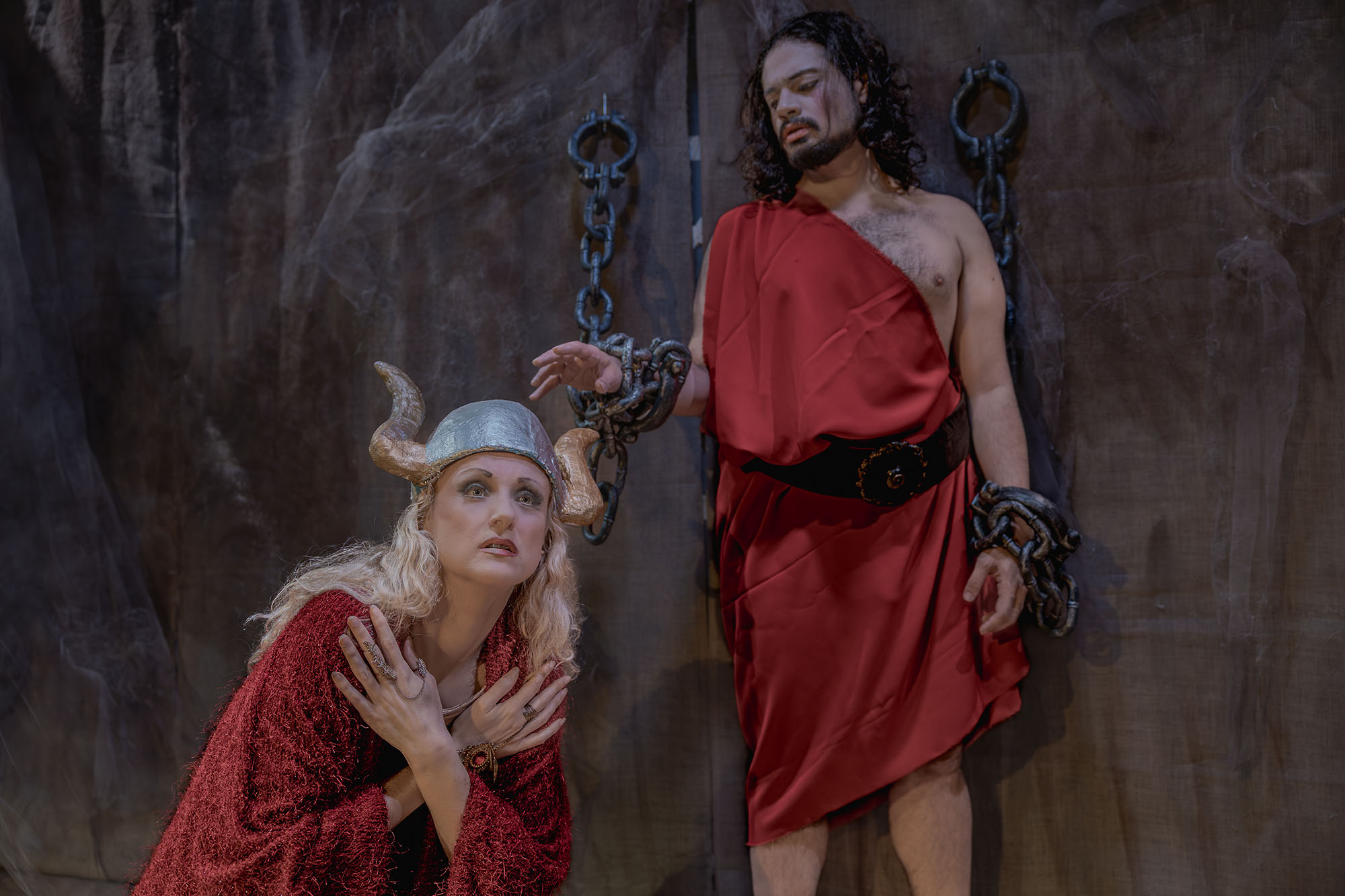
About Theatre of the No
The theater, which opened its doors on April 18, 2024, with Samuel Beckett's "Waiting For Godot" is dedicated to embracing diversity and creativity. We welcome new writers and creators from Greece and around the world to share their voices on our stage. Our programming includes a wide range of genres and styles, from thought- provoking dramas to avant-garde experiments, encompassing Modernist, Absurdist, and Experimental Theatre, as well as Music, Poetry, and Performance Art.
In 2024, THEATRE OF THE NO will stage two operas, followed by three new operas in the 2025 season, spotlighting new and upcoming opera composers and introducing young audiences to this wonderful form of art.
CAST
Composed by: Panagiotis Karousos
Prometheus: George Housakos, baritone
Io: Irini Konsta, soprano
Oceanid: Hlín Leifsdóttir, soprano
Ocean/Hermes: Stefanos Kaltsis, tenor
Piano: Christiana Manou
Stage direction: Irini Konsta
CREATIVE TEAM
PHOTOGRAPHER: Nikos Pagonakis
SOCIAL MEDIA: Petra Tseliou
COMMUNICATIONS and PUBLICITY: Eleftheria Sakareli
EXECUTIVE PRODUCER: Fail Better Productions
DATES
12th June – 24th July
Runs: Every Wednesday: 20.00
Duration: 90’
Audience arrival: 19:00 to meet the creative staff and fellow audience members
ΤICKETS:
15€
Drama Student Discount: tickets at the theatre box office for €12.
Early Arrival Discount: Α limited number of tickets are available for €5 to people arriving 1 hour before the performance.

"Prometheus Bound" is a melodic opera that follows the journey of Prometheus, a symbol of independence and enlightenment and infused with romanticism and lyrical exuberance, transporting the listener into a magical mysterious world.

The timeless myth of Prometheus remains profoundly relevant, presenting humanity with the eternal dilemma of rebellion against tyrannical power in any historical era, and the destructive effect of passive attitudes. The rebellious Prometheus is the first known individual who rebelled against the authorities for the sake of the people, rebelling against the power of Zeus who was trying to exterminate the human race.
Prometheus Bound originally premiered in Montreal, Canada in 1994 and was performed intermittently in New York, Washington DC and Paris.

About Theatre of the No
The theater, which opened its doors on April 18, 2024, with Samuel Beckett's "Waiting For Godot" is dedicated to embracing diversity and creativity. We welcome new writers and creators from Greece and around the world to share their voices on our stage. Our programming includes a wide range of genres and styles, from thought- provoking dramas to avant-garde experiments, encompassing Modernist, Absurdist, and Experimental Theatre, as well as Music, Poetry, and Performance Art.
In 2024, THEATRE OF THE NO will stage two operas, followed by three new operas in the 2025 season, spotlighting new and upcoming opera composers and introducing young audiences to this wonderful form of art.
CAST
Composed by: Panagiotis Karousos
Prometheus: George Housakos, baritone
Io: Irini Konsta, soprano
Oceanid: Hlín Leifsdóttir, soprano
Ocean/Hermes: Stefanos Kaltsis, tenor
Piano: Christiana Manou
Stage direction: Irini Konsta
CREATIVE TEAM
PHOTOGRAPHER: Nikos Pagonakis
SOCIAL MEDIA: Petra Tseliou
COMMUNICATIONS and PUBLICITY: Eleftheria Sakareli
EXECUTIVE PRODUCER: Fail Better Productions
DATES
12th June – 24th July
Runs: Every Wednesday: 20.00
Duration: 90’
Audience arrival: 19:00 to meet the creative staff and fellow audience members
ΤICKETS:
15€
Drama Student Discount: tickets at the theatre box office for €12.
Early Arrival Discount: Α limited number of tickets are available for €5 to people arriving 1 hour before the performance.
Published in
Performing Arts
Tagged under
Tuesday, 18 June 2024 13:48
Flower Power 3 Group Exhibition At FokiaNou Art Space
Opening Date: Thursday, June 20 at 20:00
From Thursday to Saturday, 18.00 - 21.00.
From Thursday to Saturday, 18.00 - 21.00.
FokiaNou Art Space loves flowers in art, which is why from the summer of 2022 it has launched its annual exhibition series entitled Flower Power, focusing on this emblematic symbol of life and beauty that has consistently inspired the art world. The third version of the exhibition, curated by Mary Cox and Panagiotis Voulgaris, is presented this season following an open call for the artists.
The apartment on Fokianou Street is transformed into a unique garden full of flowers and plant motifs, materialized in original works of painting, collage, ceramics, photography, origami and an installation. Flower Power 3, invites us to discover the magical world of flowers and their stories of life and death, decay and eternity, love and hope, sorrow and joy, transformation and rebirth.

The exhibition features artworks by:
Sebastian Boulter, Bettina Buschbeck, Andromachi Giannopoulou, Dimitra Gounari, Sidan Ghazi, Christine Grek, Piyi Wong, Maria Karasavvidou, Nina Kotamanidou, Li, Stathoula Liaska, Ioanna Lin, Annette Luycx, Christos Movidis, Lina Bebi, Pandora Mouriki, Despoina Pantazi, Dida Papalexandrou, Kristel Pent, Caroline Pradal, Geeta Roopnarine, Vicky Samouilidou, Stella Sevastopoulos, Carol Skinner, Vassiliki Spyrou, Georgia Touliatou, Marios Trichas, Panagiotis Ferentinos, Sofia Charoni.
Curated by: Mary Cox and Panagiotis Voulgaris

About FokiaNou Art Space
FokiaNou Art Space is an active artistic hub that encourages the collaboration of Greek and foreign artists, contributing to the local artistic community. Since 2016, under the direction and curatorship of visual artists Mary Cox and Panagiotis Voulgaris, more than 60 group, two-person and solo exhibitions, as well as creative workshops and talks have been held at the space.
Curated by: Mary Cox and Panagiotis Voulgaris

About FokiaNou Art Space
FokiaNou Art Space is an active artistic hub that encourages the collaboration of Greek and foreign artists, contributing to the local artistic community. Since 2016, under the direction and curatorship of visual artists Mary Cox and Panagiotis Voulgaris, more than 60 group, two-person and solo exhibitions, as well as creative workshops and talks have been held at the space.
Published in
Art
Tagged under


